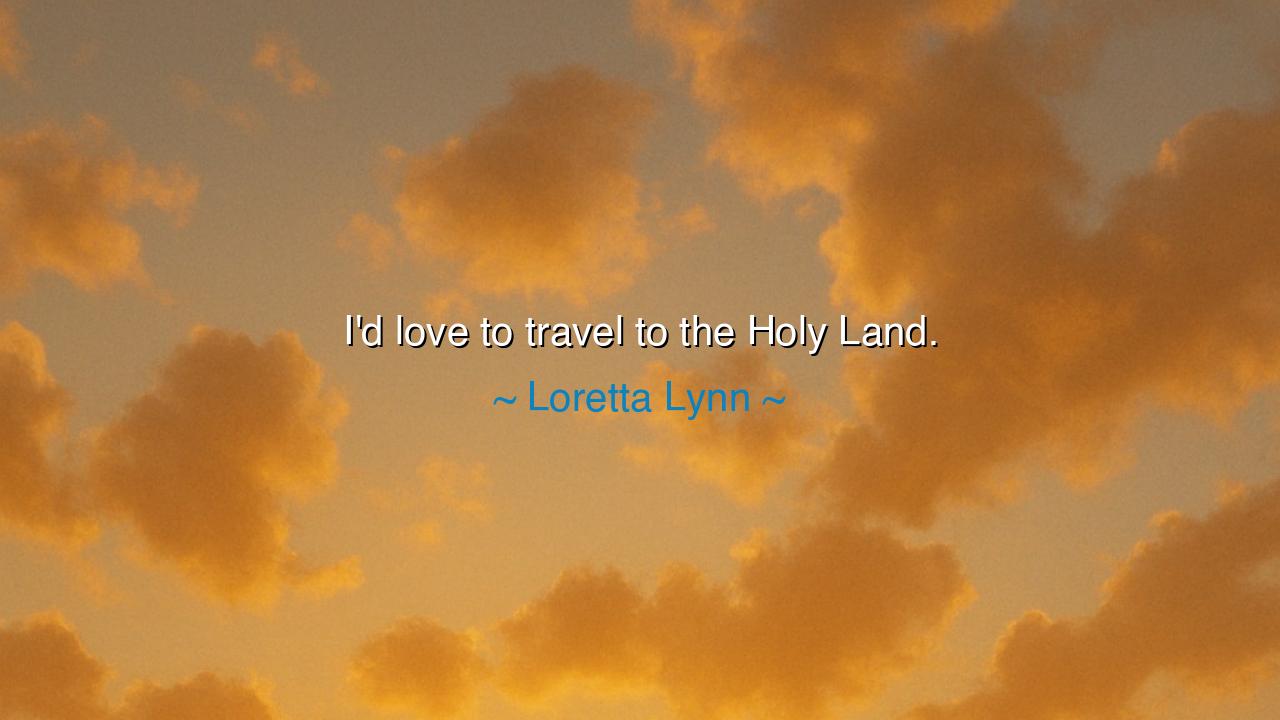
I'd love to travel to the Holy Land.






Loretta Lynn, the coal miner’s daughter whose voice carried the cries and hopes of countless souls, once spoke with humble yearning: “I’d love to travel to the Holy Land.” In this short utterance lies something greater than mere longing for a journey. It is the confession of a heart that desires not only to see but to touch the sacred, to place her feet upon the soil where the ancient stories unfolded, to walk where prophets spoke and where Christ Himself once walked. The Holy Land is not just a destination of geography; it is the place where heaven seemed to meet earth.
The origin of this desire stretches deep into the human story. From the earliest centuries of the Christian faith, men and women journeyed across oceans and deserts to stand in Bethlehem, to pray at the River Jordan, to kneel at the hill of Calvary. Pilgrims risked bandits, starvation, and exile, not for comfort, but for the chance to breathe the air of the sacred. For Loretta Lynn, raised with faith rooted in the soil of America, the longing to visit this place was the same longing that burned in the hearts of millions before her: to encounter God in the land where His story was written into stone, river, and dust.
The ancients themselves held pilgrimage as a holy act. The Jews of old were commanded to journey to Jerusalem three times a year, to bring their offerings and their prayers to the Temple. The Muslim faithful make their way to Mecca, seeking purification and closeness to God. In all traditions, the act of leaving behind one’s daily life to walk toward the sacred has been seen as a transformation, not just of the body’s path, but of the soul’s condition. Lynn’s words place her in this timeless river of longing: she too desired to walk as a pilgrim.
History gives us stories of great transformation through such journeys. Consider Saint Helena, the mother of Constantine, who in her later years traveled to the Holy Land and, by her devotion, helped uncover many of the sacred sites of Christianity, including the place believed to be Christ’s tomb. Her journey changed not only her life but shaped the history of faith, for pilgrims followed in her footsteps for centuries. Lynn’s desire echoes that same devotion—to touch the earth where faith becomes flesh and memory becomes presence.
There is also a deeper meaning in this longing: the Holy Land is not merely a place of stone and relic, but a symbol of the human search for holiness itself. To desire to travel there is to confess a thirst for the eternal, to say with one’s heart: “I wish to be nearer to the source.” Even if one never reaches that land, the longing itself purifies, for it reminds the soul that life is not only about fields and labor, not only about fame and fortune, but about seeking the presence of God wherever it may be found.
The lesson is clear: all of us must seek our own Holy Land. For some, it may be Jerusalem itself; for others, it may be the sacred stillness of prayer, the simple act of service, the place where love is given and received. To live without such longing is to live without direction, but to live with it is to carry within us a compass that always points toward heaven.
Practically, this means we must make room in our lives for pilgrimage—whether that pilgrimage is across the sea or across the heart. Take time to step away from the ordinary and walk toward the sacred. Read the stories of those who came before. Pray in places that awaken your spirit. Seek the holy, and in seeking, you will find that your own soul is transformed.
Thus, Loretta Lynn’s words, simple and heartfelt, carry the weight of an ancient tradition: “I’d love to travel to the Holy Land.” To say this is to confess a longing for the sacred journey, to join the chorus of pilgrims who across time have sought to stand closer to God. May her desire awaken in us the same longing—to make every road we walk a step closer to the Holy.






AAdministratorAdministrator
Welcome, honored guests. Please leave a comment, we will respond soon